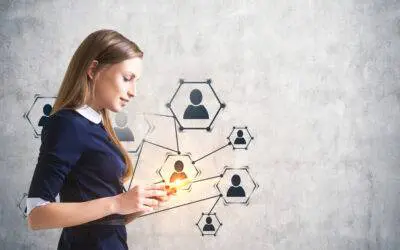Our focus this month is “Reinvention” in the workplace. Many see the upcoming Chinese New Year of the Rabbit as the ideal time to rebuild relationships, empower growth mindset, continue to invest in wellbeing, and encourage learning and development.

Debbie Mannas: Head of Organization Development and Talent [Sun Life Asia]
An HR strategist, with over 20 years in multi-disciplinary HR leadership positions, Debbie Mannas’ focus has been on cultivating high performing and inclusive cultures through creating a vision with stakeholders, building and leading strong teams, and designing and facilitating great learning experiences using a variety of methodologies.
Debbie was an early adopter of gamification, with years of embedding its philosophies into performance management and experiential learning programs, building strong teams and pipelines. Debbie believes that aligning learning to business outcomes and using data to tell the story is crucial.
In what way would this apply to HR professionals and how will this impact your workplace?
So very much has changed in workforce expectations! The last two years saw many new HR initiatives paused, pivoting to make sure our employees were able to be productive and stable in a COVID world. However, this year, it feels like we can breathe again… and business is ramping up.
In my opinion, HR must have the skills to guide stakeholder transformation and “reinvention” to leverage the possibilities hybrid working promises; to use technology, which is continuously evolving; and to implement DEIB strategies as a talent imperative and not a nice to have. Technology has made geographically networked teams possible, and we must think beyond borders (projects sans borders, anyone?), beyond needing 100% of experience, beyond teams designed to meet a leader’s comfort zone.
We also need more HR teams to work in the businesses and vice versa.
For all this to happen, all business and HR disciplines must align and work together to create and support internal opportunities across verticals and geographies, which become the norm, rather than the exception.
What should be the key areas of focus that would support your workforce in reinventing themselves?
Transcend the traditional notions of linear career paths. Now it’s all about transferrable skills – anticipating, and sponging up new skills, even if you are not going to use it them your current role. Gigs have opened possibilities to close skills gaps and are currently underused and undersold. But for a gig to be successful, managers must be open to the experience of managing diverse people: individuals from different verticals, geographies, personal preferences, ways of thinking and working, cultures, etc. This puts DEIB success front and center as a horizontal enabler, running right across all the employee touchpoints, a key driver of EVP.
How important do you see personal development as part of this transformation?
If you are not ahead of the change, hungry for new skills, you will not recognize opportunity when you see it. Worse, you may turn down opportunities (particularly women) when they’re offered. Acquiring new skills is a skill. To get competent in a new skill, talk to lots of people, research and seek out opportunities to gain exposure, even if it’s just dipping your toe. It will give you familiarity and remove the fear and make deeper knowledge more fun. Sometimes we are already engaging in experiences that relate to a new skill; see if you can expand that and build in additional elements.
Surveys show that this is indeed true for millennials in terms of self-improvement- how should organisations support their goals?
It’s easy to send people for lots of workshops, online classes etc. But the best learning is the experience in working across silos, managing smaller networked teams, and gradually switching your mindset to regard all employees as a future team member.
In the “future of work”, alignment, clarity, clear outcomes, a culture of feedback, and consequences anchored to outcomes, are especially important. Nothing new in this, but now, oh so critical to achieving the business outcomes hybrid and networked teams promise.
Establishing a framework to reward the leaders who are active mentors and sponsors, especially of under-represented and under-served minorities will allow you to build a culture of equitability and talent development in leaders and will expand the internal pool from where you can get your high potentials. Thus, the whole organisation participates. I like to call this the “learning village”.
Building psychological safety is so essential, as is supporting millennials through mental health issues in themselves and their families. This may be a time of mental unrest for many mid-career to even senior millennials, especially those who have young children or teenagers. Mental wellness is becoming more and more openly discussed these days and organisations need to be very intentional in listening to employee voices and building leaders who are passionate about creating psychological safety in the workplace.
To achieve these objectives, what type of skills need to be developed?
A deep curiosity and love of learning. The term “Growth Mindset” has been around for a long time, but never has it been more necessary to be hungry for personal evolution and adaptability. I can give you a long list of skills that need developing in today’s world, but all that may change tomorrow. Therefore, to see learning everywhere and all the time, even in adversity, and never dismiss feedback, is a critical skillset. Do you feel your adrenaline pump at the thought of solving a new problem or learning a new skill? How about unlearning, re-inventing, or expanding an existing skill? Sometimes, that’s what reinvention is all about. We have the answers in us, we just have to want it, believe we can, and experiment.
If your workplace does not allow you an opportunity to experience a new skill, try a side hustle, or volunteering. It’s just amazing how transferable “non-professional” experiences are to the workplace.




